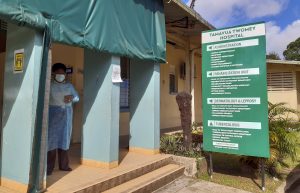After more than a year of evading widespread COVID-19 cases and deaths, Fiji is facing its biggest challenge yet. The Pacific Island nation of about 930,000 recorded 308 new cases on June 24, up from 270 the day before and 180 two days prior. New daily cases have remained in the 200s since, again breaking 300 on June 29.
The outbreak in Fiji has seen it rise to the top of the list for weekly confirmed COVID-19 cases per million people among countries with a similar population, according to Our World In Data, a scientific publication produced by a research team at the University of Oxford. Its cases per population count has also surpassed that of the United Kingdom, India, France, and many other nations hard-hit by the pandemic.
To date, Fiji has recorded 4,418 cases and 21 deaths, with more than 90 percent of cases and 18 of the 21 deaths recorded since late May. After a year of keeping the virus out, Fiji recorded its first cases of community transmission in early April, after a Fijian soldier providing security at a quarantine facility became infected and passed the virus onto a maid who then entered the community.
Fiji was quick to respond, forcing more than 330 people who came into contact with the maid into isolation and locking down Fiji’s largest cities and surrounding towns, but it wasn’t enough.
Since then, cases have steadily risen and have been found farther and farther away from the initial outbreak. Eight weeks into lockdown, as cases now spike, thousands of Fijians who were already out of work are becoming increasingly vulnerable.
Since the outbreak began, the Fijian government has paid out around FJ$11.2 million ($5.4 million) to over 224,000 Fijians as part of its $50 cash assistance program.
But fearing it wasn’t enough, several grassroots groups have sprung up to fill the void, including organizations such as Families Helping Families Fiji, Operation Tangira, and Operation Grace. On the organizations’ Facebook pages, countless messages stream in from Fijians in need.
Operation Tangira, according to their Facebook page, have been able to provide up to 50 families with enough food to last them two weeks. Operation Grace claims they’ve been able to support up to 265 families since they began their outreach efforts three weeks ago.
Many individuals, too, are assisting where possible, by offering food, sanitary items, and financial support.
Fiji’s Permanent Secretary for Health James Fong said a nationwide lockdown is not a feasible option, given the high number of people who would not be able to stand the economic impacts.
“The tragic reality is that Fijians living in communities most vulnerable to the virus – including those in informal settlements – are also those most vulnerable to the socioeconomic catastrophe that a 24-hour lockdown for 28 days would bring about,” he said.
“Even under such a strict lockdown, we believe the virus would continue to circulate within many of these communities.”
Instead, the Fijian government is relying on its so-far successful vaccine program to bring an end to the outbreak.
More than 272,400 people, just over 45 percent of the eligible population, have received their first dose and 38,100 their second dose of the AstraZeneca vaccine.
Most of Fiji’s vaccine supply is coming from Australia, which has pledged 1 million doses of AstraZeneca to the country.
New Zealand’s Foreign Minister Nanaia Mahuta announced last week an additional NZ$10 million for the Fijian government to support vaccination efforts.
“The assistance includes up to $5 million for the government to deliver COVID-19 operations, and $5 million to local civil society organizations working directly with households to mitigate poverty risks, including through the provision of food rations,” she said.
The Australia government has also ramped up its support, providing personal protective equipment and deploying an Australian Medical Assistance Team (AUSMAT) to assist Fiji’s healthcare professionals and to trace and contain the spread of COVID-19.

































